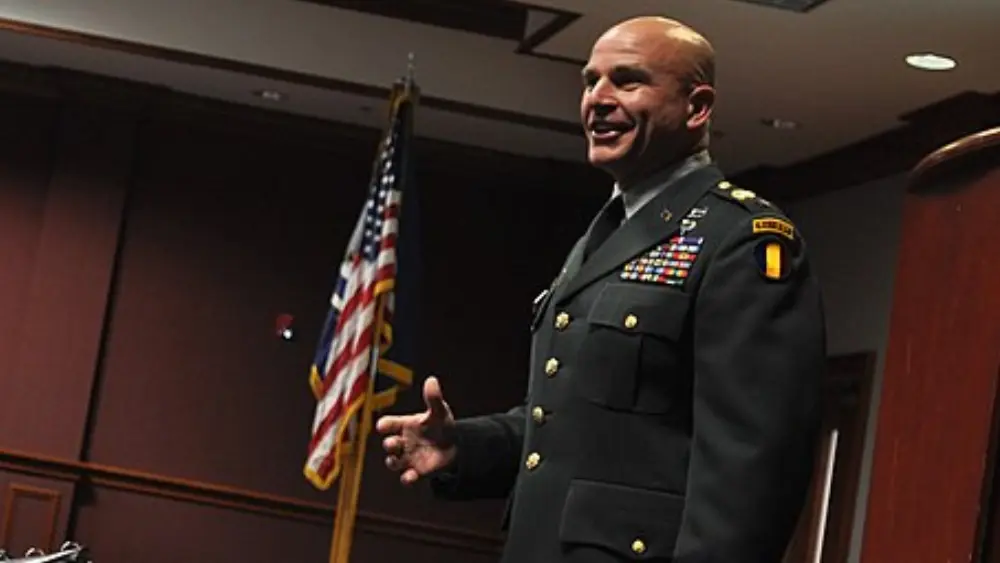Lieutenant General Herbert Raymond McMaster, known as H. R. McMaster, born on July 24, 1962, in Philadelphia, Pennsylvania, is an American military officer and strategist who rose through the ranks to become a prominent figure in U.S. national security and foreign policy.
Early Life and Military Education
H. R. McMaster’s early life was characterized by a deep-rooted affinity for military history and an unwavering desire to serve his country. Born July 24, 1962, in Philadelphia, McMaster’s upbringing was influenced by his father, a Veteran of WWII and Korea. Raised in a military family, McMaster deeply respects the sacrifices and valor of armed forces members. This early exposure to military history and values fueled his passion for a career in the military.
McMaster pursued patriotism at West Point, undertaking demanding academic and military training to fulfill his aspirations for service. In 1984, he graduated from West Point, equipped with leadership, strategy, and discipline from the renowned institution. West Point instilled in him duty, honor, and the country’s core principles, shaping his exceptional education and character during his time there. This formative period laid the groundwork for McMaster’s remarkable career in the U.S. Army, where he would go on to make significant contributions in the realms of military strategy and leadership.
H. R. McMaster: Gulf War and Early Leadership
H. R. McMaster’s journey through the ranks of the U.S. Army reached a pivotal moment during the Gulf War (1990-1991), where he distinguished himself as a formidable leader. As a captain of the 2nd Cavalry, McMaster was in a pivotal era’s core conflict. It was during this time that his military prowess and unwavering dedication to duty came to the forefront. McMaster’s leadership at the Battle of 73 Easting in Kuwait’s desert was truly exemplary. His tactical acumen and courage under fire earned him well-deserved recognition among his peers and superiors.
Battle of 73 Easting highlighted McMaster’s swift, strategic decision-making amid intense pressure in the U.S.-Iraqi conflict. His fearless, calculated battlefield approach not only boosted mission success but also established him as a rising U.S. Army star. McMaster’s early leadership laid the foundation for a distinguished military career in strategy and national security.
Continued Military Service and Education
Continuing his military service beyond the Gulf War, H. R. McMaster embarked on a journey of ongoing education and distinguished service. McMaster’s commitment to honing his skills and knowledge led him to pursue advanced degrees, including a Master of Arts in American History from the University of North Carolina and a Ph.D. in History from the University of North Carolina at Chapel Hill. This dedication to academic excellence complemented his practical military experience, allowing him to bring a unique blend of scholarly insights and battlefield expertise to his roles within the military.
As McMaster’s military career progressed, he held a series of increasingly influential positions, including serving as a military historian and strategist. His expertise in military history and strategy not only informed his own decision-making but also contributed to the development of U.S. military doctrine. Throughout his continued service, McMaster’s dedication to his country and his tireless pursuit of knowledge remained constant in his remarkable career.
H. R. McMaster: Counterinsurgency and the Iraq War
H.R. McMaster’s pivotal experiences in Iraq during the early 2000s served as the crucible that forged his profound insights into the realm of counterinsurgency warfare. As an astute military strategist, McMaster was not content with merely waging conventional warfare; instead, he recognized the intricate challenges posed by insurgent movements and asymmetric threats. It was in this turbulent theater of operations that McMaster honed his skills and developed innovative approaches to counterinsurgency. His notable achievement was his instrumental role in orchestrating and executing successful counterinsurgency strategies in the city of Tal Afar, where his leadership and keen understanding of the dynamics at play led to a significant reduction in violence and an improvement in security conditions. This experience not only demonstrated McMaster’s ability to adapt and innovate in the face of complex challenges but also laid the foundation for his future endeavors in military strategy and policy.
McMaster’s expertise in counterinsurgency warfare would prove to be a valuable asset in the years to come. His insights, derived from the crucible of Iraq, were not confined to a single deployment but rather became a cornerstone of his military career. As he advanced through the ranks, McMaster’s deep understanding of counterinsurgency principles informed his strategic decision-making and influenced policy development. His experiences in Iraq highlighted the importance of winning not just on the battlefield but also in the hearts and minds of the local population—a lesson that would resonate in subsequent conflicts and military operations. McMaster’s journey through Iraq exemplified the transformative power of real-world experience, shaping not only his personal convictions but also the broader landscape of military thinking on counterinsurgency.
Authorship and Intellectual Contributions
H.R. McMaster’s writings have made a lasting impact on military history and policy analysis. His seminal work, “Dereliction of Duty: Lyndon Johnson, Robert McNamara, the Joint Chiefs of Staff, and the Lies That Led to Vietnam” (1997), stands as a testament to his scholarship and analytical acumen. Within its pages, McMaster meticulously dissects the grave decision-making failures that plagued American leadership during the Vietnam War. By delving deep into the actions and inactions of key figures like Lyndon Johnson, Robert McNamara, and the Joint Chiefs of Staff, McMaster unearths the systemic issues that contributed to the nation’s entanglement in a protracted and disastrous conflict. His book not only serves as a historical exposé but also underscores the critical role of military advice in the policymaking process, shedding light on the consequences of disregarding expert counsel in matters of national security.
“Dereliction of Duty” earned widespread acclaim for its incisive analysis and rigorous research, cementing McMaster’s reputation as a scholar and thought leader in the field of military history and strategy. His work continues to be studied and cited by academics, policymakers, and military professionals alike, highlighting the enduring relevance of his insights into the intricate interplay between military and civilian leadership. McMaster’s ability to dissect complex historical events and draw profound lessons from them has contributed significantly to the understanding of the intersection between policy, strategy, and military operations, making him a respected figure in both the academic and policy realms.
H. R. McMaster: National Security Advisor
In February 2017, H. R. McMaster assumed the pivotal role of National Security Advisor under the administration of President Donald Trump, marking a significant chapter in his distinguished career. McMaster, as National Security Advisor, shaped key U.S. approaches to various national security concerns. He addressed North Korean threats, led Afghanistan military talks, and aided anti-terrorism strategies notably during his tenure. McMaster’s tenure emphasized enhancing national defense with a strategic, forward-thinking approach to address complex challenges.
In this role, he displayed unwavering dedication, offering crucial advice and strategic guidance at the highest government levels. McMaster’s nuanced and pragmatic approach to national security significantly influenced the policies and decisions of the Trump administration. As he navigated a complex landscape of global threats, he remained focused on safeguarding the United States and its allies.

Retirement and Continued Influence
In May 2018, H.R. McMaster transitioned from active military service to retirement, capping off a storied career that had spanned decades. However, retirement did not mark the end of his influence in the realms of national security and foreign policy. McMaster’s expertise and insights retained prominence, shaping discourse on critical global issues and remaining highly sought after. As a retired general and former National Security Advisor, he offered rich experience in military strategy, international relations, and leadership.
McMaster’s public engagement showcased his commitment to contributing his knowledge and perspective to national security discussions and decision-making. His influential post-retirement contributions underscored the lasting impact of his career and the relevance of his insights into geopolitics.











